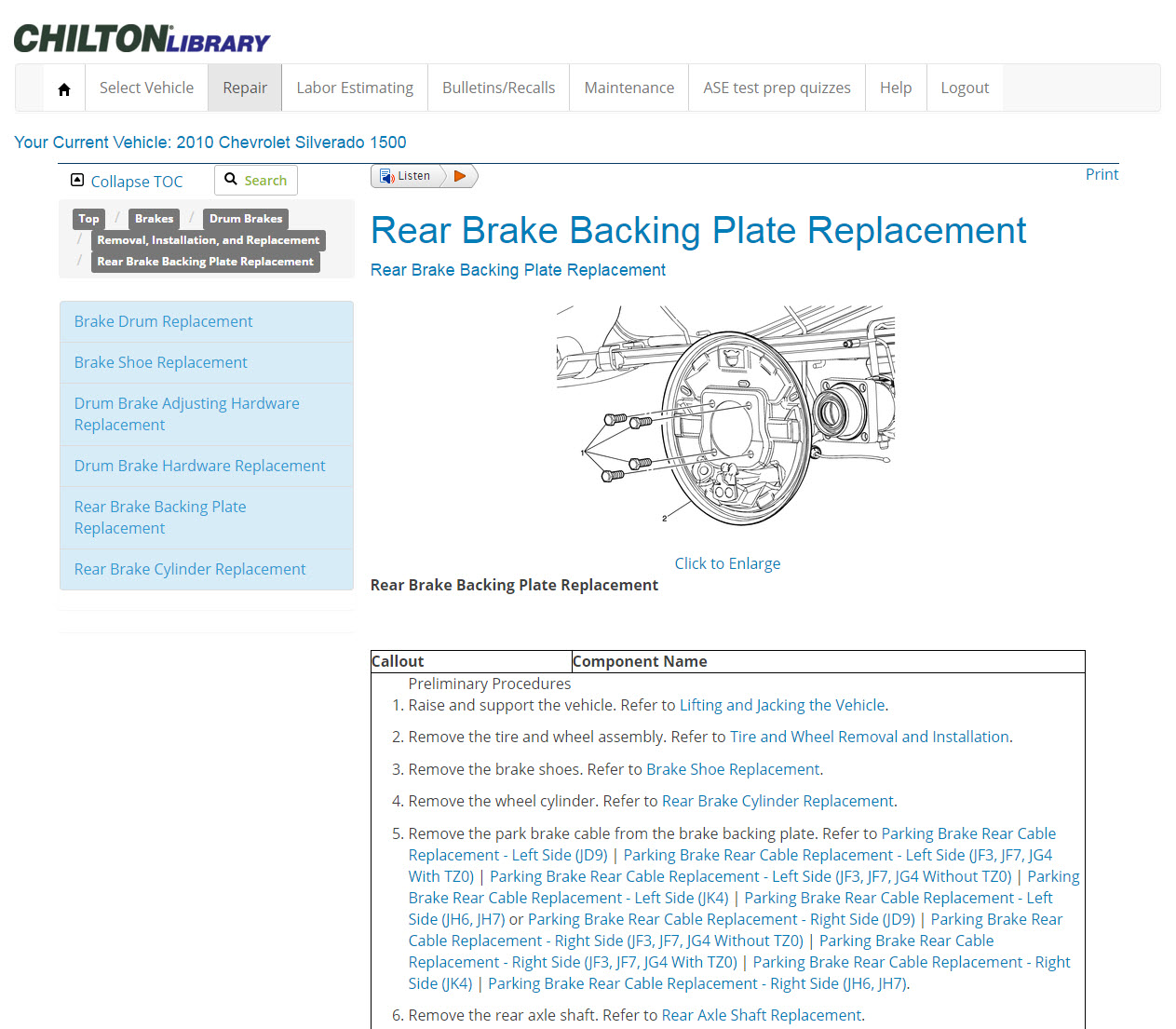Posted on April 18, 2016
By Mary Kelly
One of my favorite databases to play with is Gale’s Chilton collection. Not because I am a car person. (To me a car is a giant purse on wheels.) Not because as a librarian it is the easiest way to do car repair reference (which is very true). The Chilton database is more like my own personal marriage saver. This is because I have been married to an auto engineer for more than thirty years and car vocabulary is constantly the lingua franca of our household. This arrangement is great since I really don’t have to worry about car stuff. However, I do have to listen to all sorts of talk about cars. I am also told (in great detail) about car maintenance issues and why it is important.
Chilton is my personal car vocabulary resource/translator for about 75% of our conversations. (Yeah, this database is bookmarked for me.) It helps me explain my car problems to the Engineer husband, followed by criticisms of my general lack of car knowledge and failure to follow regular maintenance schedules. This discussion is usually punctuated by people shouting and swearing. (Note: The current version does not include any definitions for the accompanying swearing associated with car repairs. Perhaps Chilton’s can consider adding swear words as a “feature” in future releases, until that happens, you are on your own.)
As a librarian, I am also subject to the constant discussion of electronic vs. print debate that seems to follow me everywhere. Frankly, the topic itself is getting to be old hat and as a database lover and physical book person no one seems understand that it isn’t just one or the other. Personal preference and the intended use of the information is evidently not a satisfying answer for the crowd.
Regardless of your personal opinions of the electronic vs. book information debate, the Chilton Library database is an excellent example where electronic information offers a good alternative to large sets of manuals. Patrons/customers search and print exactly what they need without hauling a large book around. The increased sophistication of automobiles also requires very specific and detailed information, which is better served in a database rather than in print.
In my particular library, where space and budget are at a premium, I can serve a wide variety of information needs with the database. Retiring the physical copies of the Chilton manuals freed nearly an entire stack of shelf space in my library. These hard copies also took a beating from use and were often expensive and difficult to replace if lost or damaged. I really did cheer when we finally retired the books (after an appropriate moment of silence for their service to the library).
Even my less tech savvy patrons prefer the database, as it can be tailored to just what they need. I have been able to email instructions or walk customers through the Chilton database easily. Most library patrons know exactly what they need and prefer to leave with a few pages of printouts on their specific project.
The Chilton Library database has a wide variety of tools to assist anyone involved in cars, from amateur to professional. The database is driven by the car’s make, model, and year. After selecting your particular vehicle, you can then drill down to your specific question or problem. Think of this as an owner’s manual on steroids. Even for the most clueless mechanical mind, it is easy to at least be able to identify your car’s particular problem or feature. Going to the mechanic to explain a particular issue is much easier with the correct vocabulary and a detailed description.
Those more knowledgeable will appreciate features such as labor cost estimation, recalls, and other up-to-date information from the manufacturer. Within each section there are also keyword-driven links that allow you to browse, as well as a help menu. For those aspiring mechanics there are even a test quizzes for ASE technician certification.
To demonstrate how amateurs can use the database, here is an example of a definition I looked up of an “EEC” module.
“The EEC system provides optimum control of the engine through the enhanced capability of the powertrain control module (PCM). The EEC system also has an on board diagnostic (OBD) monitoring system with features and functions to meet federal regulations on exhaust emissions.”
The bottom line for me is that I was able to at least explain where and what kind of problem I had, and there was minimal swearing and stress on my relationship (at least on my part). I truly appreciate the ability to serve my auto-minded library customers with the Chilton database.
Not a ChiltonLibrary subscriber? Trial it today!
[alert-info]
About the Authors
Holly is the Adult Services Coordinator at the Plymouth District Library in Plymouth, MI. She has a mild obsession with collection quality (ok, maybe not so mild) and can be found at the Readers’ Advisory desk dreaming up read-alikes.
Mary is the Youth Services Librarian at the Lyon Township Public Library in South Lyon, MI. She, too, is obsessed with collection quality, and has taken it up a notch with never ending shelf lists, spreadsheets, and inventory. Mary has a special knack for linking books to readers of all ages.
Together Mary and Holly are the authors of “Making a Collection Count: a holistic approach to library collection management.” They also tweet at @awfullibbooks and blog at awfullibrarybooks.net.
[/alert-info]Nike SF-AF1


